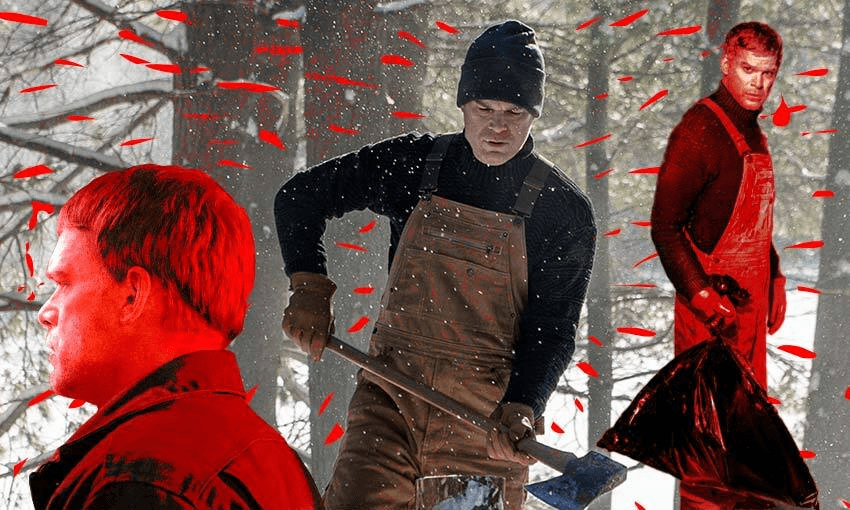A new-look Dexter is up to his same old serial killer tricks. Was this revival really necessary?
Warning: This review of Dexter: New Blood contains spoilers (and several references to plastic sheeting)
“What are you? A serial killer?” Dexter Morgan’s latest victim is naked, bloody and confused, tied down on a makeshift gurney in a garden shed that’s been sealed in plastic sheets. The Wall Street douchebro finds himself immobile, yelling questions at TV’s most infamous serial killer, after shooting Dexter’s favourite deer in the head. It’s a mistake he’s about to regret.
“I was,” replies Dexter, clad in a butcher’s apron, clutching a knife. It’s been 10 years since he last did any of this. With a new city, career change and steady girlfriend, he’d considered himself reformed, free of his bloodthirsty vices – until now. “You know what?” reconsiders Dexter, his knife glinting in the moonlight, “You’re right. It’s not so much that I ‘was’. It’s that I ‘am’.”
At this point, viewers might have their own questions. Mostly: what are we doing back here? Showtime’s Dexter petered out in 2013 after eight seasons and an anti-climactic finale that saw Morgan giving up the serial killer life to become a lumberjack. Many loathed it, and I’d long given up. Dexter ran out of ideas after season five, rinsing, then repeating, the same storylines.
Like the later stages of Nip/Tuck and 24, what was once tense and shocking had become predictable and boring. More than that, Dexter became a morally dubious entertainment choice: watching it made me feel gross. Yes, earlier seasons were knottier, and Michael C Hall’s freakish ability to switch between friendly jackass and bloodthirsty psycho was consistently watchable.
But a torturous death in a plastic-wrapped room was Dexter’s weekly highlight, a grim proposition that had made me question the attraction.
Perhaps it was a sign of the times. Dexter came at the tail end of a generation of television that asked us to feel things for troubled male leads. Tony Soprano was the first, followed by Don Draper, then Walter White. Dexter asked even more from viewers. Could we side with a serial killer? It turns out many of us could. Bring that up next time you see your therapist and see what comes out.
So, here we are, 15 years on from Dexter’s debut, at the beginning of season nine. He’s got a new identity, James Lindsay, but the friendly residents of the sparsely populated Iron Lake township like to call him “Jimmy” or “Jimbo”. Lindsay works in a hunting and fishing store, buys his boss strawberry cream cheese sweet rolls and goes line dancing with his girlfriend Angela, a cop, after work. Sometimes they have roadside sex in the back of Jimbo’s pick-up truck.
So far, so Saul Goodman, slumming it in Cinnabon at the start of every season of Better Call Saul. A former bad boy living the quiet life isn’t going to sustain a whole series – and it doesn’t. Dexter’s past begins to catch up with him. His son Harrison arrives on the scene. The sight of blood stirs something in him. So do the annoying antics of that Wall Street douchebro.
As Lindsay fries up a ham steak then splashes it with Tabasco sauce for breakfast – a delightful reference to those original, iconic opening credits – the ghost of his sister Debra haunts him. She died in the season eight finale knowing who her brother really was. “You’re a changed man,” she says, playing the angel on his shoulder. “Almost 10 years without a kill and I love you for it.”
The devil comes in many guises. John Lithgow is returning this season, reprising his role as the Trinity Killer from Dexter’s fourth season, proving writers still struggle for fresh blood. For now, Dexter’s lured back to the dark side, pretty easily, it has to be said, by the arrogant antics of the douchebro, escalating to their showy snowdown over a deer carcass. It leads to an inevitable plastic-wrapped conclusion. In other words, Dexter is back on his bullshit.
After this setup, it’s easy to see how New Blood’s 10 episodes will play out. The douchebro’s dad is being set up as Dexter’s main protagonist. Harrison and Angela will begin to realise they’re dealing with a complete psycho. At some point, the Trinity Killer will show up to complicate things. A few more will end up in plastic wrap. They might deserve it. They might not. “I may be a monster – but I’m an evolving monster,” says Dexter near the end of the episode. It was a refrain repeated often through those first eight seasons.
If you’re a fan, this is everything you’d want from a Dexter revival in 2021. But the question remains: aside from nostalgia, what’s the point? After this first episode, it just feels like more of the same. I’m out, but I have other, more personal, reasons for skipping this. When Hall was at the peak of his Dexter fame, in the summer of 2011, he came to New Zealand. He went to the beach to recover from jetlag, then suffered through a day of press, visiting The Edge, The Rock and Hauraki, as well as an interview with David Farrier, inexplicably situated in Tāmaki Makaurau’s marina.
Then Hall sat with me, knee-to-knee in a tiny NZ Herald basement office, for an intense 15-minute chat. Afterwards, he stood up, nodded and said: “We really went there.” Then he demanded a hug. It remains one of the most intense embraces I have endured, a strong bear hug that enveloped me, chilling my core. Afterwards, I broke into a cold sweat. It’s something the new season of Dexter can only dream of.
All eight seasons of Dexter are streaming now on Sky Go and Neon, as is episode one of Dexter: New Blood

